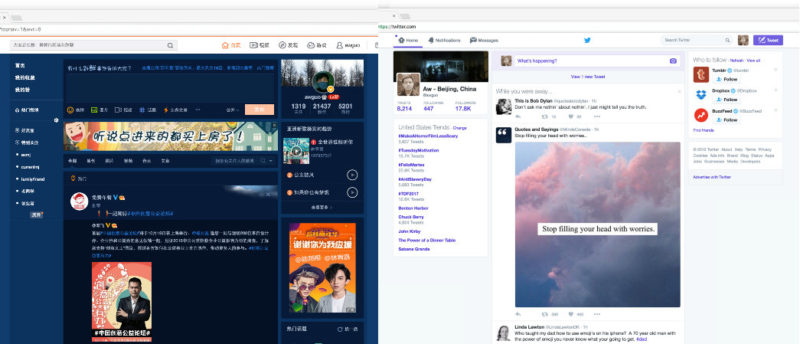Explaining why Twitter is worth less than its “Chinese clone”

A few days ago, Tech In Asia published the provocatively titled article, Twitter is now worth less than its Chinese clone. Coming fresh off the heels of Twitter’s recently-failed acquisition talks, the article definitely resonated with many members of the tech community. But as many of us know, Sina Weibo itself is a fallen star, having been hobbled by political censorship laws and then ultimately overtaken by WeChat.
Expanding on the subject, Beijing-based blogger and entrepreneur Aw Guo explains how Weibo has managed to hang on, and the differences between it and its American counterpart.
First how it survived and thrived:
- Pivoting away from politics into entertainment by promoting the latter more intensely.
- Using comments instead of replies: “On Weibo you can reply to any “tweet” or retweet it. Your reply won’t be seen by your followers. I think the logic seems to be very easy to understand. But on Twitter it’s so annoying. Sometimes when I reply to someone, the messages are on my timeline, seen by my followers. And on Weibo, if you got attacked by trolls, you can turn off Reply feature so the trolls have to use “Retweet”. I guess there are very few trolls would retweet because they are not willing to make contributions to the retweet counts.”
- Framing it more “like traditional internet media” via copious content vertical and trending topics.
- Creating support for posts that are more than 140 characters.
And secondly how Weibo monetizes (beyond just ads):
Weibo has a feature called “微博会员”, that’s literally “VIP membership” for it… There are a lot of “privileges” for the VIP members [including]:
- 后悔药(Regret-Aid): You can recover your removed post if you regret deleting it.
- 悄悄关注(Follow someone in dark): You can follow someone without showing up in his/her follower list. Nobody will know you’ve followed that person.
- 关注上限提高(More following): Weibo by default lets you only follow 2,000 people. With this you can follow more. (Twitter doesn’t have this limit at all)
- 屏蔽来源(Block specified source): You can block content from a customized source. Like from some app, or including some keywords.
- 举报跟踪(Report tracking): You can see what action has the platform taken according to your report.
For the full explanation, please see Aw Guo’s post, Why $WB is doing better than $TWTR that drives user growth and revenue?